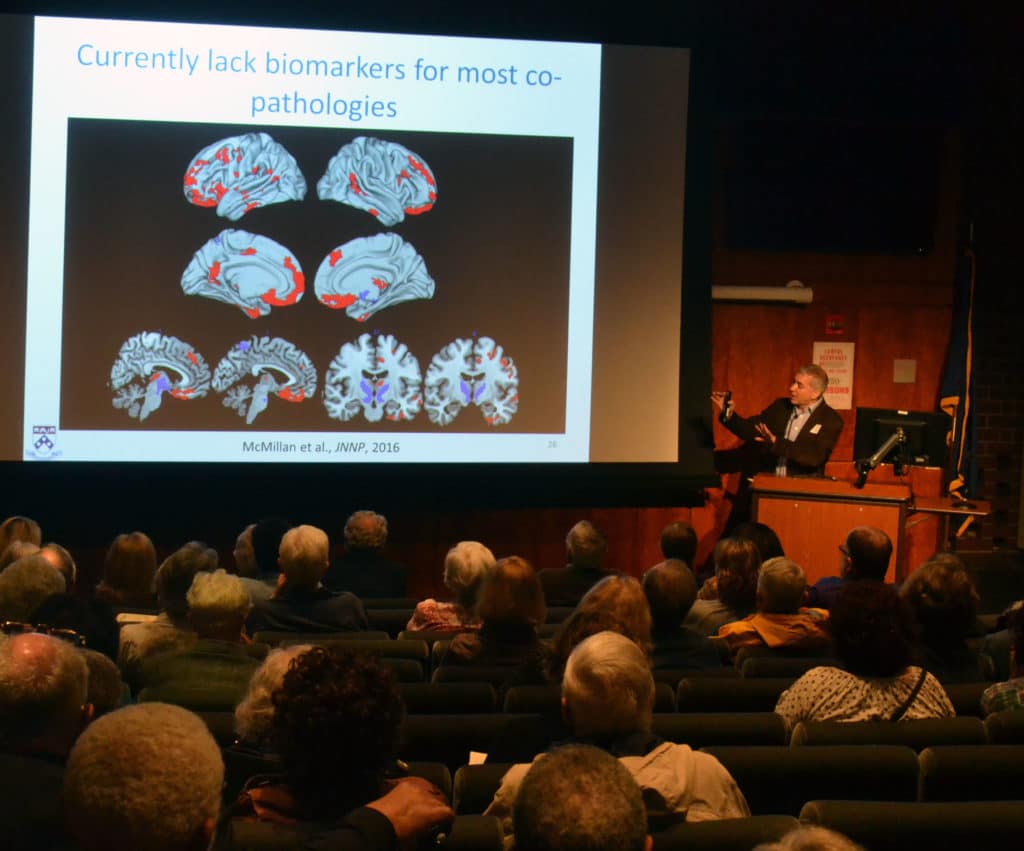
Black adults are underrepresented in Alzheimer’s disease research, even though they are more likely to develop the disease. The Aging Brain Cohort Study Dedicated to Diversity will seek to enroll more Black participants like Jay Austin (above), to combat this disparity. Austin cited this disparity as his motivation for participating in research.
Black adults are more likely than other groups to develop Alzheimer’s disease or related disorders but are poorly represented in Alzheimer’s disease research, including recent clinical trials. This health disparity illustrates how Black individuals can benefit from advances in the field if they had access.
This week, the Pennsylvania Department of Health’s Commonwealth Universal Research Enhancement (CURE) program announced it will award a $3.5 million grant to Penn Memory Center (PMC) researchers and community partners to address the underrepresentation of Black adults in Alzheimer’s disease research. The grant supports the Aging Brain Cohort Dedicated to Diversity (ABCD2) study, a research and training initiative led by David Wolk, MD, a professor of Neurology in the Perelman School of Medicine at the University of Pennsylvania. Wolk is also the incoming director of the Alzheimer’s Disease Research Center, and PMC co-director.
In the past, diagnosis of Alzheimer’s disease could definitively be made only using an autopsy. Today, there are tools to visualize its pathological markers, the amyloid plaques and tau-based tangles. The goal of ABCD2 is to create one of the largest neuroimaging cohorts of Black individuals to date, in addition to training underrepresented minorities in the science and clinical care of Alzheimer’s disease.
The research will enhance understandings of the relationships between measures of disease and cognitive decline, and the transition from normal aging to the earliest stages of Alzheimer’s disease, before disability. Determining these relationships and the role of additional risk factors, like vascular disease, genetics, and sociodemographic factors, will benefit Pennsylvanians with advances in risk prediction and prevention studies.
“There has been an Alzheimer’s disease research revolution in the past few years. We can now detect pathology prior to the development of cognitive symptoms, and the field is moving towards targeting individuals with preclinical AD to slow or prevent the emergence of cognitive symptoms,” Dr. Wolk said. “Unfortunately, much of what we know about these markers of disease and risk come from studies that are almost entirely composed of white individuals. Thus, the degree to which findings generalize to Black individuals in the context of potential differing co-morbidities and other social determinants of health is unknown and critical for this population to benefit from these advances.”

Co-Director David Wolk, MD, presents ABC data at the 2018 Research Partner Thank You Luncheon.
As part of the neuroimaging effort, the researchers are looking to determine not only the relationship between molecular positron emission tomography (PET) measures of Alzheimer’s disease with measures of brain change and cognition, but also the degree to which these relationships are impacted by additional risk factors such as poverty and the quality of education, vascular disease, and genetics. By determining these relationships and the role of these modulating factors, the team aims to develop advances in risk prediction to be incorporated in prevention studies.
Researchers are also emphasizing training the next generation of investigators and clinicians. Building a diverse workforce will mitigate future disparities in care and research. A training program for underrepresented minorities aims to create a clinical and research workforce that is more representative of Pennsylvania.
The ABCD2 study includes collaborations with investigators Tania Giovannetti, PhD, an associate professor of psychology at Temple University, and Stephen Moelter, PhD, co-director of the neuroscience program and associate professor of psychology and neuroscience at the University of Sciences.
“I was thrilled to have the opportunity to join my colleagues at Penn on the ABCD Study,” Dr. Moelter said. “The project’s joint goals of addressing the relative absence of high-quality Alzheimer’s biomarker data in African-Americans and delivering a high-quality summer internship experience to African-American undergraduate and graduate students are in my mind essential. These objectives will improve diagnosis and treatment of AD and take a small step toward closing the systemic gaps that create barriers for students from under-represented groups getting started in biomedical research.”
Dr. Giovanetti added that understanding the aging brain in study samples that reflect the growing aging population in the US is critical.
“As a Pennsylvanian I am very proud that our state has prioritized research on diverse older adults,” she said. “The clinical scientists at PMC conduct cutting-edge research on dementia, and it is inspiring to be on such an accomplished team of investigators.”
The study also collaborates with community partners, including Alpha Kappa Alpha Sorority Inc.’s Omega Omega chapter, Alpha Phi Alpha Fraternity Inc., and Enon Tabernacle Baptist Church. Community partners will support the design, recruitment, training, and dissemination of the study.
“It is such a great opportunity to work with the PMC,” said Rev. Leroy Miles, associate pastor at the Enon Tabernacle Baptist Church. PMC has partnered with the church since November 2019. “Alzheimer’s dementia disproportionately impacts our community which causes us major concern. My mother prior to her passing exhibited cognitive decline. It was very challenging as her son to experience my mother in this state and equally, I did not know how to support my mother. We appreciate the Penn Memory Center’s practical approach to caring for our loved ones.”

PMC Community Partner Frederick Okoye (left), PMC Co-Director Jason Karlawish (center left), and PMC ambassador Karen Wheeler (center) pose with Alpha Phi Alpha brothers after an informational event, “Alzheimer’s in our Community.”
Frederick Okoye is a third-year medical student at the Philadelphia College of Osteopathic Medicine. As a community partner, he is collaborating with PMC and Alpha Phi Alpha Fraternity, Inc. on the ABCD2 study.
“I became a community partner with PMC to take an active role in addressing brain health disparities among the African American community in Philadelphia. Representation in research means a great deal to me and working with PMC has shown me the importance of strong community engagement. I look forward to cultivating relationships with Philadelphia community leaders and organizations to tackle brain health issues together.”
“Our hope is that ABCD2 will create a foundation to improve diversity in Alzheimer’s disease research and clinical trials. This effort will be strengthened by the training of clinicians and researchers through the complementary training plan,” said Jason Karlawish, MD, co-director of the PMC and a co-leader for the ABCD2 training effort. “This is truly a collaborative effort across universities and community partners. This is an ambitious project, and our team and partners have the infrastructure in place and experience to meet this challenge.”